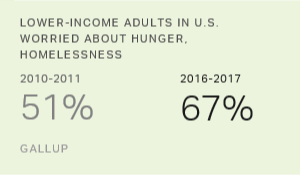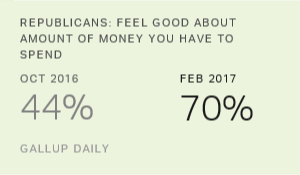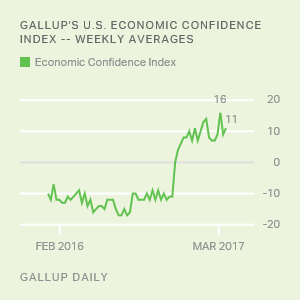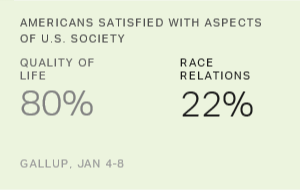Story Highlights
- 67% of lower-income adults worry "a great deal" about hunger, homelessness
- Up from 51% in 2010-2011
- Middle-income (47%), upper-income (37%) much less worried
WASHINGTON, D.C. -- Over the past two years, an average of 67% of lower-income U.S. adults, up from 51% from 2010-2011, have worried "a great deal" about the problem of hunger and homelessness in the country. Concern has also increased among middle- and upper-income Americans, but they still worry far less than do lower-income Americans.
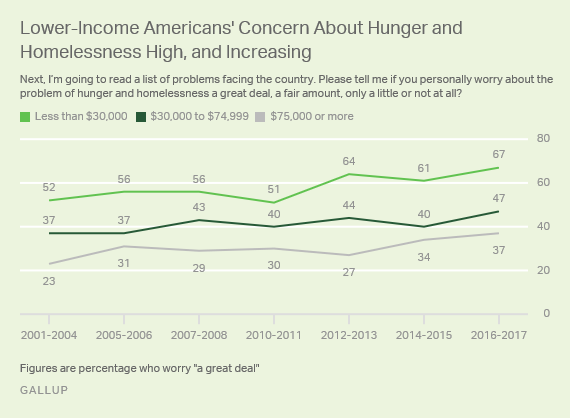
Since 2001, worry has been highest among those residing in lower-income households, likely because those with limited financial resources are more at risk of going hungry or becoming homeless. A consistent majority of lower-income adults worried about the problem before 2012, but that has only increased in the past five years. Concern among middle-income Americans in 2016-2017 falls just short of the majority level at 47%, while 37% of upper-income Americans are worried.
Rising concern among all income groups could be a result of the political and media attention devoted to U.S. income inequality in recent years. Americans may also worry more about hunger and homelessness when other issues are not dominating the national consciousness, such as the economy and budget deficit were in 2010-2011 and terrorism was in the years after 9/11.
Overall, 47% of Americans now worry about hunger and homelessness "a great deal," according to Gallup's March 1-5 survey, tied with 2016 as the high in the trend. Previously, concern had been as low as 35% in 2004 and as high as 45% in 2001, the first year Gallup asked the question.
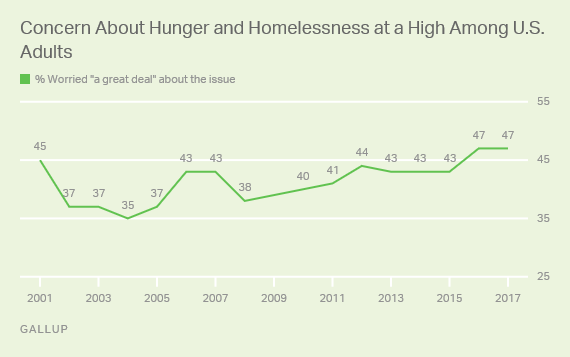
Hunger Top Concern Among Lower-Income Americans
Concern about hunger and homelessness now ranks as high as, or higher than, concern about most other issues tested in Gallup's annual Environment survey. The only issue with a significantly higher "worried a great deal" percentage in this year's poll is the availability and affordability of healthcare, at 57%.
But among lower-income Americans, hunger and homelessness eclipses healthcare, making it the top-ranking issue of the 13 tested in the March 1-5 survey. Among middle- and upper-income Americans, the availability and affordability of healthcare generates the greatest worry, with hunger further down the list.
Crime and violence, as well as healthcare, also are prominent concerns for lower-income Americans. Crime is a prominent concern for middle-income Americans as well, but much less so for upper-income Americans. It does not rank among upper-income Americans' top concerns.
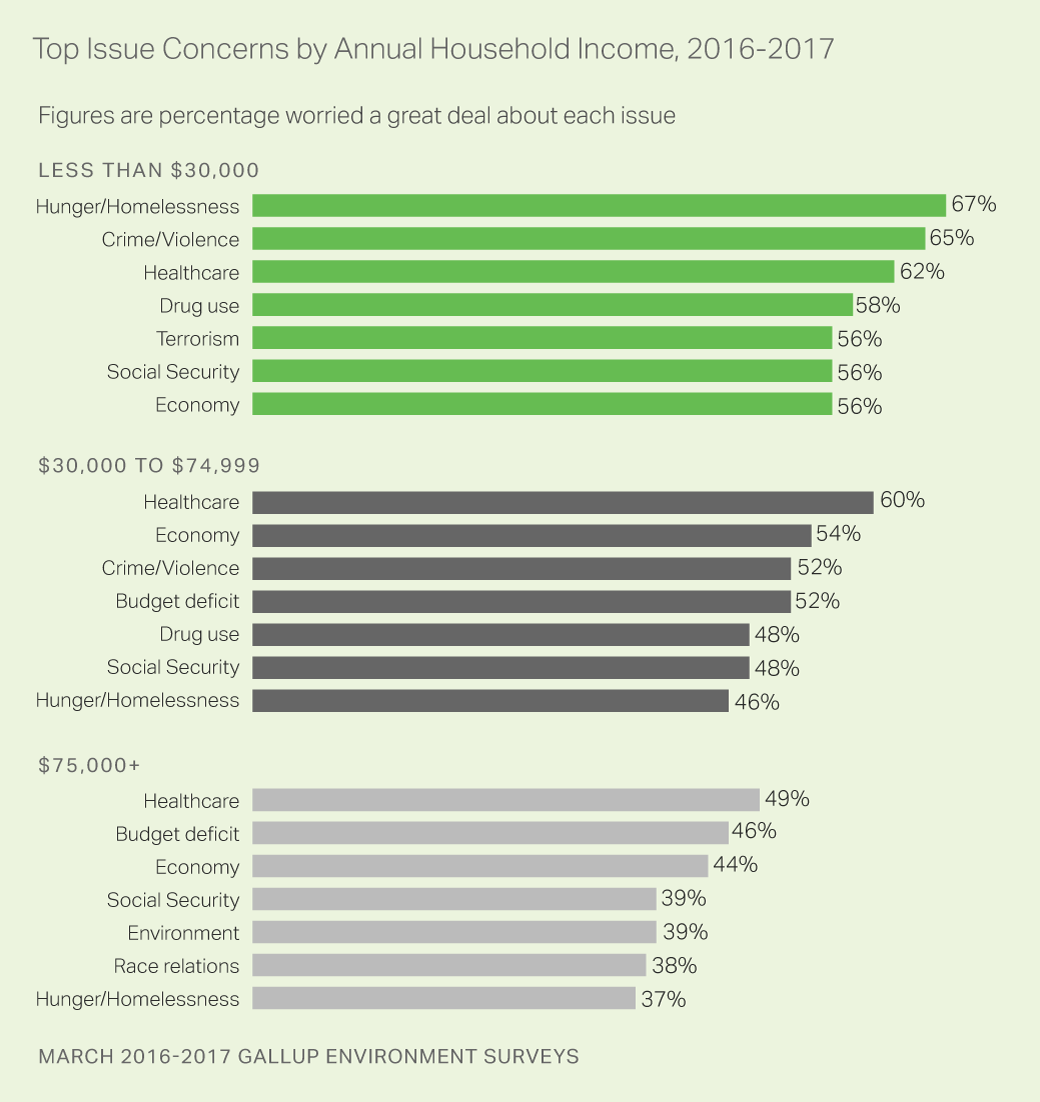
Lower-income Americans do tend to worry more about all of these problems than do those with higher incomes. On average, across the 13 issues, the percentage of lower-income adults who worry a great deal is seven percentage points higher than among middle-income Americans, and 17 points higher than among upper-income Americans.
But differences in concern about hunger and homelessness far exceed those norms. In fact, the 20-point difference in worry about hunger and homelessness between lower-income and middle-income Americans is higher than for any of the other issues. Similarly, the 30-point difference in worry about hunger and homelessness between lower-income and upper-income Americans ties for the highest, along with concern about crime and violence.
Implications
Americans at all income levels are expressing greater concern about hunger and homelessness, and it is the top worry among lower-income Americans, who are most likely to struggle to pay for adequate food and housing.
It is unclear why Americans are worrying more about hunger and homelessness now, since it is an ever-present problem. But at times the issue may fade from public consciousness when other matters dominate the national agenda. It is possible that greater concern will lead to greater public pressure for action on the issue. However, President Donald Trump's first federal budget has been criticized for deep cuts to federal anti-poverty programs. If Trump's budget passes largely as it has been outlined, then state and local governments, charitable organizations and private citizens would need to increase their efforts to help reduce poverty and its effects -- or hope that the president's economic policies expand opportunities for the most financially vulnerable in society.
Historical data are available in Gallup Analytics.
Survey Methods
Results for this Gallup poll are based on telephone interviews conducted March 1-5, 2017, with a random sample of 1,018 adults, aged 18 and older, living in all 50 U.S. states and the District of Columbia. For results based on the total sample of national adults, the margin of sampling error is ±4 percentage points at the 95% confidence level.
Results by income are based on combined 2016-2017 data. For results based on the total sample of 348 adults whose annual household income is less than $30,000, the margin of sampling error is ±7 percentage points at the 95% confidence level. For results based on the total sample of 732 adults whose annual household income is between $30,000 and $74,999, the margin of sampling error is ±5 percentage points at the 95% confidence level. For results based on the total sample of 735 adults whose annual household income is $75,000 or greater, the margin of sampling error is ±5 percentage points at the 95% confidence level. All reported margins of sampling error include computed design effects for weighting.
Each sample of national adults includes a minimum quota of 70% cellphone respondents and 30% landline respondents, with additional minimum quotas by time zone within region. Landline and cellular telephone numbers are selected using random-digit-dial methods.
View survey methodology, complete question responses and trends.
Learn more about how the Gallup Poll Social Series works.
